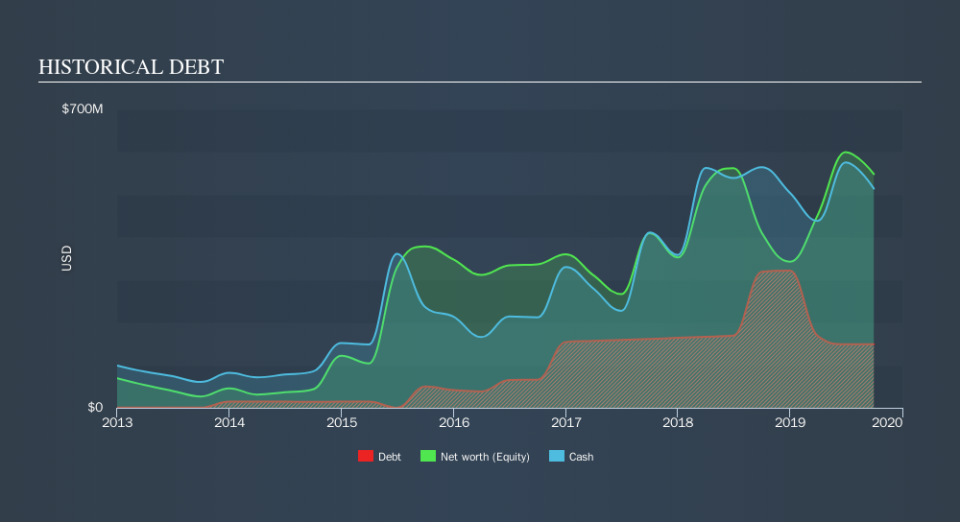Is Amicus Therapeutics (NASDAQ:FOLD) A Risky Investment?

Warren Buffett famously said, 'Volatility is far from synonymous with risk.' When we think about how risky a company is, we always like to look at its use of debt, since debt overload can lead to ruin. Importantly, Amicus Therapeutics, Inc. (NASDAQ:FOLD) does carry debt. But the real question is whether this debt is making the company risky.
When Is Debt A Problem?
Debt is a tool to help businesses grow, but if a business is incapable of paying off its lenders, then it exists at their mercy. In the worst case scenario, a company can go bankrupt if it cannot pay its creditors. However, a more frequent (but still costly) occurrence is where a company must issue shares at bargain-basement prices, permanently diluting shareholders, just to shore up its balance sheet. By replacing dilution, though, debt can be an extremely good tool for businesses that need capital to invest in growth at high rates of return. When we examine debt levels, we first consider both cash and debt levels, together.
View our latest analysis for Amicus Therapeutics
What Is Amicus Therapeutics's Debt?
You can click the graphic below for the historical numbers, but it shows that Amicus Therapeutics had US$149.3m of debt in September 2019, down from US$318.8m, one year before. But it also has US$514.2m in cash to offset that, meaning it has US$364.9m net cash.
A Look At Amicus Therapeutics's Liabilities
The latest balance sheet data shows that Amicus Therapeutics had liabilities of US$93.1m due within a year, and liabilities of US$240.9m falling due after that. Offsetting this, it had US$514.2m in cash and US$33.7m in receivables that were due within 12 months. So it can boast US$213.9m more liquid assets than total liabilities.
This surplus suggests that Amicus Therapeutics has a conservative balance sheet, and could probably eliminate its debt without much difficulty. Simply put, the fact that Amicus Therapeutics has more cash than debt is arguably a good indication that it can manage its debt safely. When analysing debt levels, the balance sheet is the obvious place to start. But ultimately the future profitability of the business will decide if Amicus Therapeutics can strengthen its balance sheet over time. So if you want to see what the professionals think, you might find this free report on analyst profit forecasts to be interesting.
Over 12 months, Amicus Therapeutics reported revenue of US$160m, which is a gain of 118%, although it did not report any earnings before interest and tax. So its pretty obvious shareholders are hoping for more growth!
So How Risky Is Amicus Therapeutics?
We have no doubt that loss making companies are, in general, riskier than profitable ones. And we do note that Amicus Therapeutics had negative earnings before interest and tax (EBIT), over the last year. Indeed, in that time it burnt through US$264m of cash and made a loss of US$345m. But at least it has US$364.9m on the balance sheet to spend on growth, near-term. Importantly, Amicus Therapeutics's revenue growth is hot to trot. High growth pre-profit companies may well be risky, but they can also offer great rewards. For riskier companies like Amicus Therapeutics I always like to keep an eye on the long term profit and revenue trends. Fortunately, you can click to see our interactive graph of its profit, revenue, and operating cashflow.
When all is said and done, sometimes its easier to focus on companies that don't even need debt. Readers can access a list of growth stocks with zero net debt 100% free, right now.
We aim to bring you long-term focused research analysis driven by fundamental data. Note that our analysis may not factor in the latest price-sensitive company announcements or qualitative material.
If you spot an error that warrants correction, please contact the editor at editorial-team@simplywallst.com. This article by Simply Wall St is general in nature. It does not constitute a recommendation to buy or sell any stock, and does not take account of your objectives, or your financial situation. Simply Wall St has no position in the stocks mentioned. Thank you for reading.

